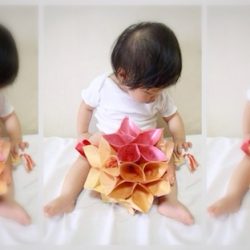SingaporeMotherhood | Baby & Toddler
February 2014
5 Ways to Develop Your Child’s Confidence

Want a cool, confident, self-assured child? Fiona Walker, the Principal of Schools / CEO of Julia Gabriel Education, shares five ways to help your child achieve these attributes.
Growing up is tough! From a very early age children are faced with many different experiences, which they are expected to handle as they progress through one milestone after another. Which parent doesn’t hope their child will grow up happy and independent, equipped with the skills to carry them through school and life, exhibiting a positive ‘I can do’ attitude?
The adults in a child’s life can help build confidence from a very early age with positive support and encouragement to learn. Confidence is not congenital but it does develop naturally given the right environment and circumstances.
[banner][/banner]
When children feel loved, safe and secure they develop a high sense of self-esteem. When we allow children plenty of opportunities to explore, discover and make mistakes, we help them master skills and abilities. A child who believes in his own competence; who is aware of what he has achieved and, perhaps more importantly, what he can achieve, will approach tasks and situations with a higher degree of confidence than a child who has been robbed of the opportunity to experience something new or try for himself.
Children can start learning to ‘have a go’ from a very early age. A baby turning the pages of a board book, a preschooler tying their shoelaces, a young child helping to make a sandwich – small achievements help children to realise that they can make bigger strides as they develop. It’s natural for a parent or caregiver to want to rush in and help, especially when we are in a hurry or fear the result will be one big mess! But try to avoid doing so. Step back and give your child time. Impatience will only dampen their confidence.
Celebrate every success as your child goes along, no matter how small. A big step to building confidence in your child is when they truly believe that you have confidence in them! Just knowing that our parents love us and support us no matter what we achieve or who we are is a huge confidence booster in itself. If we can instil positive self-belief from the earliest age possible, we will be giving our children a wonderful gift.
Tips to help your child build confidence:
Encourage independence.
Give your child the time and space to practice tasks independently, even if they make mistakes or take a long time. That’s how they learn! This means you will need to be very patient and avoid rushing in to undermine their abilities. Your child will build confidence and feel less frightened to approach the task by himself or herself next time.
Accept your child for who they are.
Avoid comparing your child with a school friend or older sibling. This can be so humiliating and result in a loss of self-esteem and reluctance to try. If your child does something well, give praise and be specific: “Wow, I think you have managed to sit properly at the table for almost the whole of dinner! Well done!” If they behave inappropriately, correct them calmly and explain why. Do not shout at your child. When we shout at a child we humiliate them and damage their confidence. Allow them to make mistakes and try again.
Plan regular exposure to new situations
.
The more exposure a child has to new situations, places and people, the more confident, they will feel about each new experience. ‘Having a go’ will become a natural part of their development. Likewise, regular exposure to a variety of social situations will help children feel more at ease with adults and peers outside the family. Be sure to ease your child gently into social situations. Stay with them until they feel confident enough to socialise independently.
Repetition and practice.
The regular and consistent practice of a task helps children predict what will happen next and enables them to develop a sense of security. Establishing daily routines helps. Once children become familiar with the routine, their ability to control their own lives confidently increases.
Role model.
Children learn by copying the adults around them. It’s easy to forget how impressionable our children are when they watch us! If we approach a task calmly, trusting in our own abilities or handle a difficult situation or person with polite assertiveness, this is the code of behaviour and attitude our children will pick up on.
A child’s confidence develops when they receive emotional and physical warmth and care within a loving, supportive family. By talking and listening to our children we get to know who they are. We understand their character, their strengths and their interests. By respecting their individuality and setting realistic goals we enable them to learn, build self-esteem and flourish as they grow from strength to strength.
Fiona Walker is the Principal of Schools / CEO of Julia Gabriel Education. She holds a Masters in Early Childhood Education and is a qualified Montessori teacher with more than 20 years of experience in providing quality education for young children.
All content from this article, including images, cannot be reproduced without credits or written permission from SingaporeMotherhood.
Follow us on Facebook, Instagram, and Telegram for the latest article and promotion updates.






